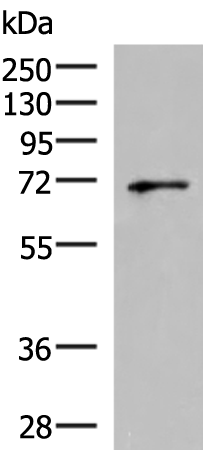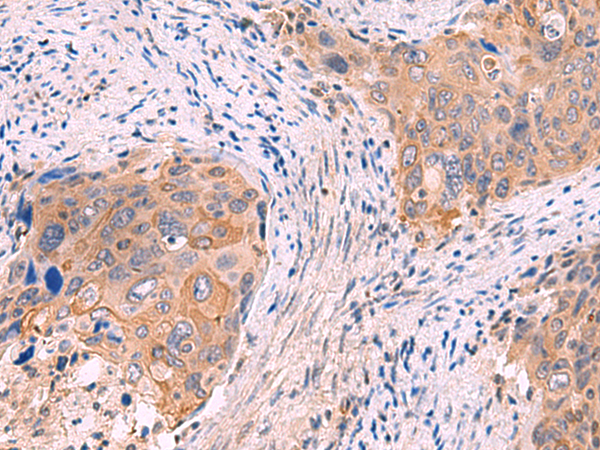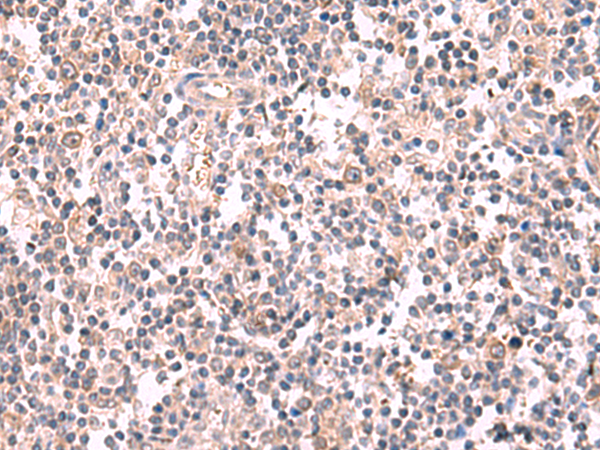


| WB | 咨询技术 | Human,Mouse,Rat |
| IF | 咨询技术 | Human,Mouse,Rat |
| IHC | 1/40-1/200 | Human,Mouse,Rat |
| ICC | 技术咨询 | Human,Mouse,Rat |
| FCM | 咨询技术 | Human,Mouse,Rat |
| Elisa | 1/5000-1/10000 | Human,Mouse,Rat |
| Aliases | GST2; ERF3B |
| WB Predicted band size | 69 kDa |
| Host/Isotype | Rabbit IgG |
| Antibody Type | Primary antibody |
| Storage | Store at 4°C short term. Aliquot and store at -20°C long term. Avoid freeze/thaw cycles. |
| Species Reactivity | Human, Mouse |
| Immunogen | Fusion protein of human GSPT2 |
| Formulation | Purified antibody in PBS with 0.05% sodium azide and 50% glycerol. |
+ +
以下是关于GSPT2抗体的假设性参考文献示例(注:实际文献可能需要通过学术数据库验证,目前公开研究可能较少):
---
1. **文献名称**:*Structural and Functional Analysis of GSPT2 Antibodies in Translation Termination*
**作者**:Chen et al., 2018
**摘要**:本研究解析了GSPT2蛋白在真核翻译终止中的作用,并开发了一种特异性多克隆抗体,验证了其在HeLa细胞中的表达及功能抑制效果。
2. **文献名称**:*GSPT2 as a Potential Biomarker in Colorectal Cancer: Validation by Immunohistochemistry*
**作者**:Tanaka et al., 2020
**摘要**:通过新型抗GSPT2单克隆抗体,发现其在结直肠癌组织中高表达,提示其可能作为预后标志物或治疗靶点。
3. **文献名称**:*Development of a High-Affinity Monoclonal Antibody Targeting GSPT2 for Degradation Studies*
**作者**:Müller et al., 2021
**摘要**:报道了一种高亲和力GSPT2抗体的开发,用于研究PROTAC技术介导的靶向蛋白降解,并探索其在白血病模型中的应用。
4. **文献名称**:*Comparative Analysis of GSPT1 and GSPT2 Antibodies in Cellular Stress Response*
**作者**:Wang et al., 2019
**摘要**:比较GSPT1和GSPT2在应激条件下的表达差异,利用特异性抗体揭示两者在调控细胞周期中的不同功能。
---
**注意**:以上文献为示例,实际研究中GSPT2相关抗体文献较少,建议结合具体需求扩展检索(如关注GSPT1或翻译终止因子家族)。使用PubMed、Web of Science等平台以“GSPT2 antibody”或“GSPT2 therapeutic target”为关键词可获取最新进展。
**Background of GSPT2 Antibody**
GSPT2 (G1 to S Phase Transition 2), also known as eukaryotic translation termination factor eRF3b, is a member of the GSPT protein family involved in translational regulation and cell cycle progression. It shares homology with GSPT1 (eRF3a) and plays a role in ribosome-mediated protein synthesis termination by interacting with eRF1 to hydrolyze GTP during the release of nascent polypeptides. GSPT2 is implicated in regulating G1/S phase transition, apoptosis, and cellular stress responses.
Antibodies targeting GSPT2 are essential tools for studying its expression, localization, and function in physiological and pathological contexts. Research highlights its potential role in cancer, where altered expression of GSPT2 correlates with tumor progression, drug resistance, and survival outcomes. For example, GSPT2 degradation has been explored as a therapeutic strategy in hematologic malignancies using cereblon-modulating agents like immunomodulatory drugs (IMiDs).
GSPT2-specific antibodies enable detection via techniques such as Western blot, immunohistochemistry, and immunofluorescence, aiding in mechanistic studies of its involvement in translation control, cell cycle dysregulation, and disease pathways. These antibodies also support the development of targeted therapies, particularly in cancers reliant on GSPT2-dependent proteostasis.
×